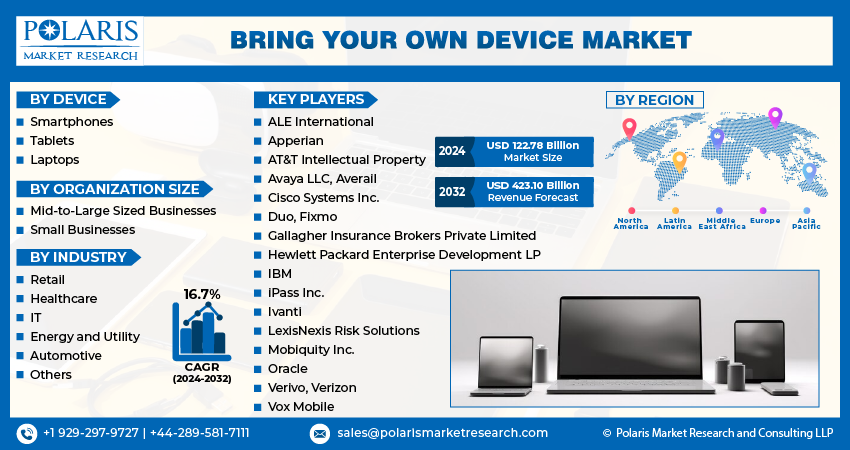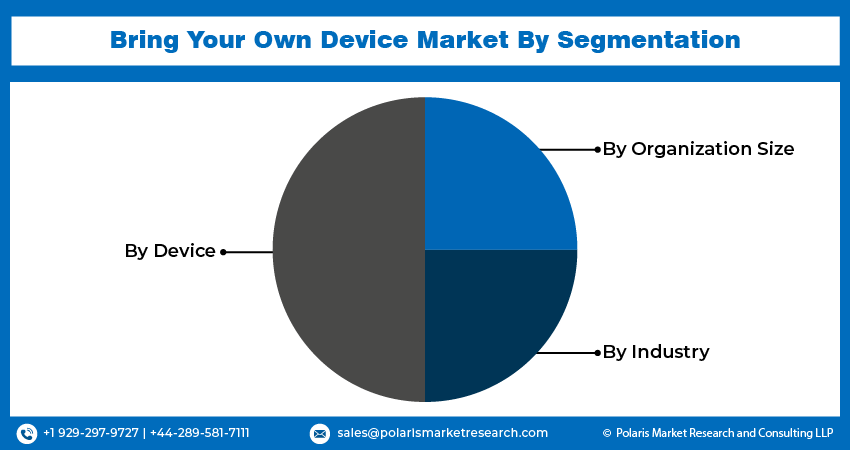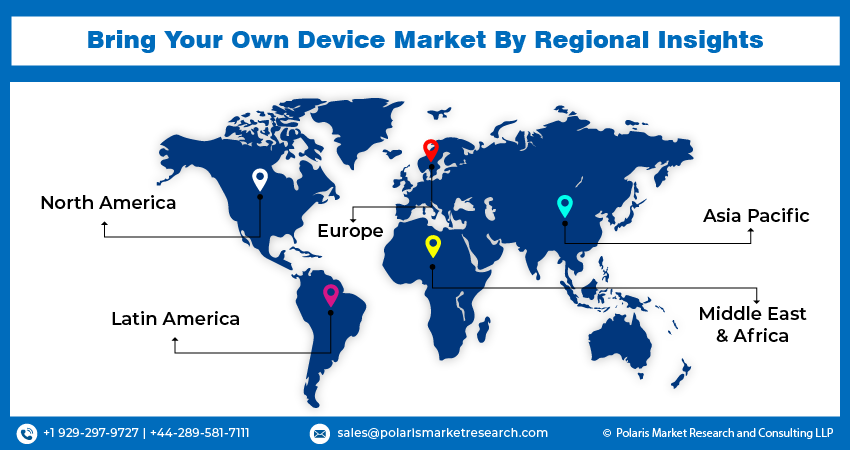
Bring Your Own Device Market Share, Size, Trends, Industry Analysis Report, By Device (Smartphones, Tablets, Laptops), By Organization Size, By Industry, By Region, And Segment Forecasts, 2024 - 2032
- Published Date:Feb-2024
- Pages: 118
- Format: PDF
- Report ID: PM4248
- Base Year: 2023
- Historical Data: 2019-2022
Report Outlook
The global bring your own device market was valued at USD 105.39 billion in 2023 and is expected to grow at a CAGR of 16.7% during the forecast period.
One of the key drivers of this growth is the widespread adoption and increased prevalence of smartphones, coupled with the deployment of advanced services such as 4G LTE, across both developing and developed economies. The BYOD trend empowers employees by allowing them to use their personally owned devices, such as smartphones, tablets, or laptops, for work-related tasks. This shift in the workplace dynamic has positive implications for productivity. As employees become more familiar and comfortable with their personal devices, they can seamlessly integrate them into their work routines. This familiarity leads to increased efficiency and effectiveness in performing various tasks, ultimately boosting overall work productivity.

To Understand More About this Research: Request a Free Sample Report
In a BYOD setting, employees can seamlessly integrate their work tasks and personal activities on single device. This eliminates the hassle of constantly switching between work and personal gadgets. By utilizing a single device for both professional and personal purposes, employees streamline their daily routines, enhance convenience, and reduce the risk of theft associated with managing multiple devices.
Bring Your Own Device Market (BYOD) implementation in enterprises presents significant security challenges that need careful consideration. One major concern is the potential for unregulated third-party access to sensitive information. When employees use their personal devices for work, it becomes crucial to establish robust security measures to prevent unauthorized access. Measuring and tracking data pose additional challenges. With employees using various devices, tracking, and managing data across different platforms can be complex. This complexity can lead to difficulties in assessing the organization's overall risk exposure, making it essential to implement comprehensive data tracking and risk assessment tools.
Device theft is another security risk associated with BYOD. Personal devices may be more susceptible to theft, and if these devices contain sensitive corporate information, the consequences can be severe. Implementing security measures such as device encryption and remote data wiping becomes imperative to mitigate the impact of device theft. Moreover, when employees with BYOD devices leave the organization, there is a risk of data retention and potential unauthorized access. Establishing clear policies for device deprovisioning and data removal upon employee departure helps address this concern.
The Bring Your Own Device Market report details key market dynamics to help industry players align their business strategies with current and future trends. It examines technological advances and breakthroughs in the industry and their impact on the market presence. Furthermore, a detailed regional analysis of the industry at the local, national, and global levels has been provided.

Industry Dynamics
Growth Drivers
Employee Productivity and Satisfaction
The flexibility provided by BYOD policies allows employees to work from anywhere, using devices they are already accustomed to. This not only enhances their work experience but also contributes to a more agile and responsive work environment. The BYOD market growth is closely linked to the advantages it offers in terms of convenience, efficiency, and the alignment of work practices with employees' preferences and habits.
Employees are increasingly favoring the use of a single device for both their personal and professional needs. This preference arises from the desire to avoid inconveniences associated with carrying separate devices dedicated to work and personal use, as well as concerns about the potential theft of multiple devices. In this context, the appeal of a Bring Your Own Device (BYOD) environment becomes evident.
Report Segmentation
The market is primarily segmented based on device, organization size, industry, and region.
|
By Device |
By Organization Size |
By Industry |
By Region |
|
|
|
|
To Understand the Scope of this Report: Speak to Analyst
By Device Analysis
Smartphones segment accounted for the largest market share in 2023
Smartphones segment accounted for the largest share. can be attributed to several factors related to the evolving needs of users, especially in the context of work and personal productivity. One key factor is the proliferation of applications developed for smartphones. Mobile developers have created a plethora of applications, including those reminiscent of popular desktop programs like Microsoft Word, Microsoft Excel, & Microsoft PowerPoint. These applications bring the functionality of traditional office software to the convenience of smartphones, enabling users to work efficiently on the go.
The convenience offered by smartphones, coupled with the power of productivity applications, has led to a shift in the way people approach work. Employees can now manage work-related tasks and documents while maintaining a balance with their personal lives. This effective blend of work and personal activities contributes to the widespread adoption of smartphones in professional settings.
Laptops segment will grow rapidly. Laptops offer a more comprehensive and familiar computing experience compared to smartphones. The larger screen, full-sized keyboard, and additional processing power make laptops well-suited for tasks that require more extensive document creation, data analysis, and complex presentations. This is particularly important for employees who need to replicate the office work environment in their homes.
By Application Analysis
IT segment held the significant market share in 2023
IT segment held the significant market share. One major advantage of BYOD in terms of cost savings is the shift in device ownership responsibility. Instead of organizations having to purchase, provision, and maintain a large fleet of company-owned devices for their employees, a BYOD policy allows employees to use their personal devices for work purposes. This can lead to substantial cost reductions related to device acquisition and maintenance.
Moreover, employees often invest in high-quality personal devices that meet their specific preferences and requirements. Leveraging these devices for work can enhance overall productivity as individuals are already familiar with the tools and functionalities of their own devices. This familiarity can lead to a more efficient and seamless work experience
Automotive segment is expected to gain substantial growth rate. The adoption of the BYOD practices is identified as a cost-effective strategy for both employees and organizations within this sector. This approach allows employees to utilize their personal devices, alleviating the necessity for organizations to make substantial investments in providing dedicated devices. This cost-saving measure is particularly pertinent in industries like automotive, where the integration of specialized technology can be financially burdensome.

Regional Insights
North America dominated the global market in 2023
North America dominated the global market. The United States stands out with its well-established and advanced technology infrastructure, encompassing widespread availability of high-speed internet and a robust cellular network. This technological foundation plays a pivotal role in enabling the utilization of personal devices for various work-related tasks. Additionally, numerous U.S. companies provide their employees with the flexibility to work remotely, contributing to a remarkably high adoption rate in the region.
The Asia Pacific will grow with substantial pace. The expansion is driven by the widespread adoption of smartphones and tablets, along with the phenomenon of IT consumerization in the region. Despite the prevalent use of personal devices for work-related activities, the challenge lies in the absence of well-established policies to support BYOD. Notably, employees in countries like China and India exhibit a strong inclination to work beyond conventional office hours, a practice not as prominent in the United States and many European nations.

Key Market Players & Competitive Insights
The market's growth is being propelled by strategic alliances initiated by key participants. These partnerships have laid the groundwork for an infrastructure that supports leadership and provides ongoing assistance in the market.
Some of the major players operating in the global market include:
- ALE International
- Apperian
- AT&T Intellectual Property
- Avaya LLC
- Averail
- Cisco Systems Inc.
- Duo
- Fixmo
- Gallagher Insurance Brokers Private Limited
- Hewlett Packard Enterprise Development LP
- IBM
- iPass Inc.
- Ivanti
- LexisNexis Risk Solutions
- Mobiquity Inc.
- Oracle
- Verivo
- Verizon
- Vox Mobile
Recent Developments
- In April 2023, VMware has launched VMware Cross-Cloud Managed Services, a comprehensive set of solutions that bring enhanced benefits to both partners and customers. This offering empowers capable partners to efficiently broaden their capabilities in the managed services.
- In July 2022, in collaboration with Microsoft, Samsung has forged a partnership aimed at transforming mobile device security for corporate clients. This joint effort has led to a significant milestone: the introduction of the industry's first on-device, mobile hardware-backed device attestation solution.
Bring Your Own Device Market Report Scope
|
Report Attributes |
Details |
|
Market size value in 2024 |
USD 122.78 billion |
|
Revenue forecast in 2032 |
USD 423.10 billion |
|
CAGR |
16.7% from 2024 – 2032 |
|
Base year |
2023 |
|
Historical data |
2019 – 2022 |
|
Forecast period |
2024 – 2032 |
|
Quantitative units |
Revenue in USD million/billion and CAGR from 2024 to 2032 |
|
Segments covered |
By Device, By Organization Size, By Industry, By Region |
|
Regional scope |
North America, Europe, Asia Pacific, Latin America; Middle East & Africa |
|
Customization |
Report customization as per your requirements with respect to countries, region and segmentation. |
Download Sample Report
Want to check out the Bring Your Own Device Market report before buying it? Then, our sample report has got you covered. It includes key market data points, ranging from trend analyses to industry estimates and forecasts. See for yourself by downloading the sample report.
Browse Our Top Selling Reports
Airlines Market Size, Share 2024 Research Report
Legal AI Market Size, Share 2024 Research Report
Pipeline Pigging Services Market Size, Share 2024 Research Report
FAQ's
ALE International, Apperian, AT&T Intellectual, Avaya, Averail, Cisco Systems, Duo, and Fixmo are the key companies in Bring Your Own Device Market
The global bring your own device market is expected to grow at a CAGR of 16.7% during the forecast period
The Bring Your Own Device Market report covering key segments are device, organization size, industry, and region
Cost Savings for Enterprises are the key driving factors in Bring Your Own Device Market
The global bring your own device market size is expected to reach USD 423.10 billion by 2032
